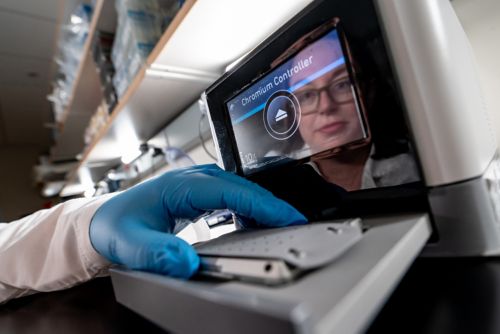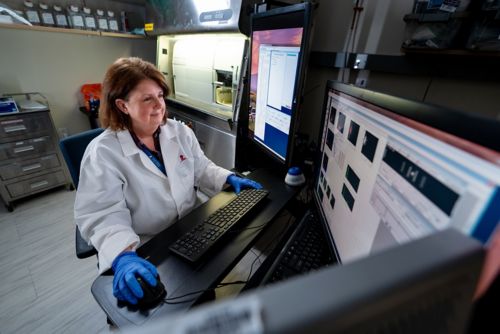St. Jude Family of Websites
Explore our cutting edge research, world-class patient care, career opportunities and more.
St. Jude Children's Research Hospital Home

- Fundraising
St. Jude Family of Websites
Explore our cutting edge research, world-class patient care, career opportunities and more.
St. Jude Children's Research Hospital Home

- Fundraising
Neurocytometry Laboratory
Expanding and accelerating scientific cancer research, utilizing unique flow cytometric tools and methodologies
Overview
Flow cytometry has been a critical part of cancer research projects. It is a powerful tool with applications in immunology, molecular biology, virology, cancer biology and infectious disease monitoring. Flow cytometry has seen dramatic advances over the last 40 years, allowing unprecedented detail in studies of the immune system and other areas of cell biology.

Impact
Flow cytometric methods have the potential to facilitate studies of individual cell types found within proximity throughout the brain matrix. However, there are still limitations in applying flow cytometry to brain tissues as these tissues must be optimally disaggregated into single cells while striving to maintain the integrity of such cells. One of the goals of the Neurocytometry Lab (NCL) is to provide researchers with opportunities via flow cytometry to develop, optimize and validate these disaggregation techniques and protocols. They then scrutinize these flow cytometry results to obtain a quantitative and qualitative understanding of their cells of interest.
To better serve each researcher’s needs, the NCL hopes to expand the capabilities of the main flow cytometry instrument, the BD Aria Fusion. An additional laser or detectors may soon be added to this four-laser system. This addition will enable researchers to expand their panel designs.
Multi-color immunophenotyping, cell cycle analysis, apoptosis studies, phagocytosis, gene quantification and cellular function measurement are just a few of the applications performed daily in the NCL. Teaching investigators the theory of flow cytometry along with one-on-one training sessions on instrumentation are frequently offered so that flow cytometry may be used to its fullest advantage.
Equipment
Biosafety: We are a certified BSL 2 facility subject to certain regulatory and administrative requirements.
Cell Sorters:
High Speed
- Becton Dickinson Aria Fusion – Cuvette, four lasers, 11 fluorescence detectors, plus Forward and Side Scatter
- Bio-Rad S3e – Jet-In-Air, three lasers, four fluorescence detectors, plus Forward and Side Scatter
Very Low Pressure
- On Chip Microfluidic Cytometer, two lasers, four fluorescence detectors, plus Forward and Side Scatter
About the lead researcher

Kimberley Lowe
Kimberley Lowe has 20 years of flow cytometry experience. She began her career as a flow cytometry operator at the Dana Farber Cancer Institute in Boston, MA and became dedicated to the field of flow cytometry. She then moved to The Scripps Research Institute in Florida, where she managed a bustling flow cytometry core facility, assisting more than 100 researchers and students on various instruments and platforms. From there, she relocated to San Jose, CA, to become a senior certified instructor for BD Biosciences, teaching flow cytometry theory and instrumentation to students of all backgrounds, developing new teaching programs and lesson plans and traveling the country to deliver expertise and instruction to clients in the field of flow cytometry. She then found her way to St. Jude Children’s Research Hospital, where she now runs the DNB Flow Cytometry Core Facility, introducing investigators to the indispensable tools of flow cytometry. Lowe has a BA in Natural Sciences from Harvard University Ext. School.